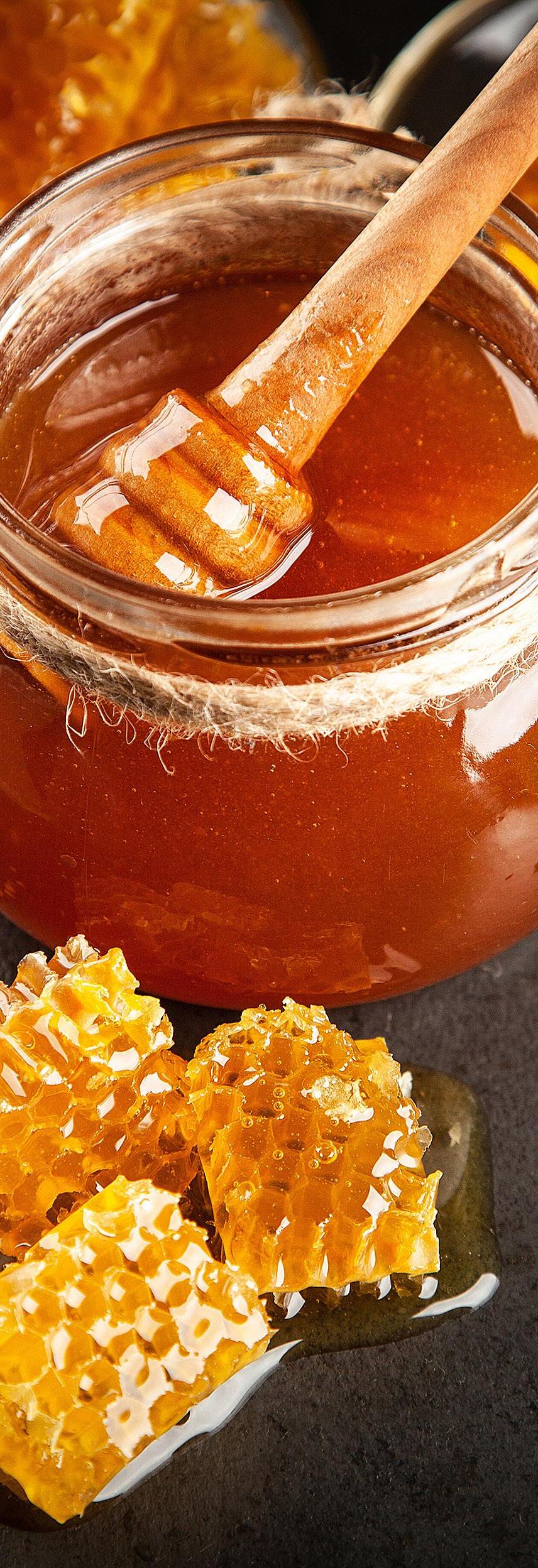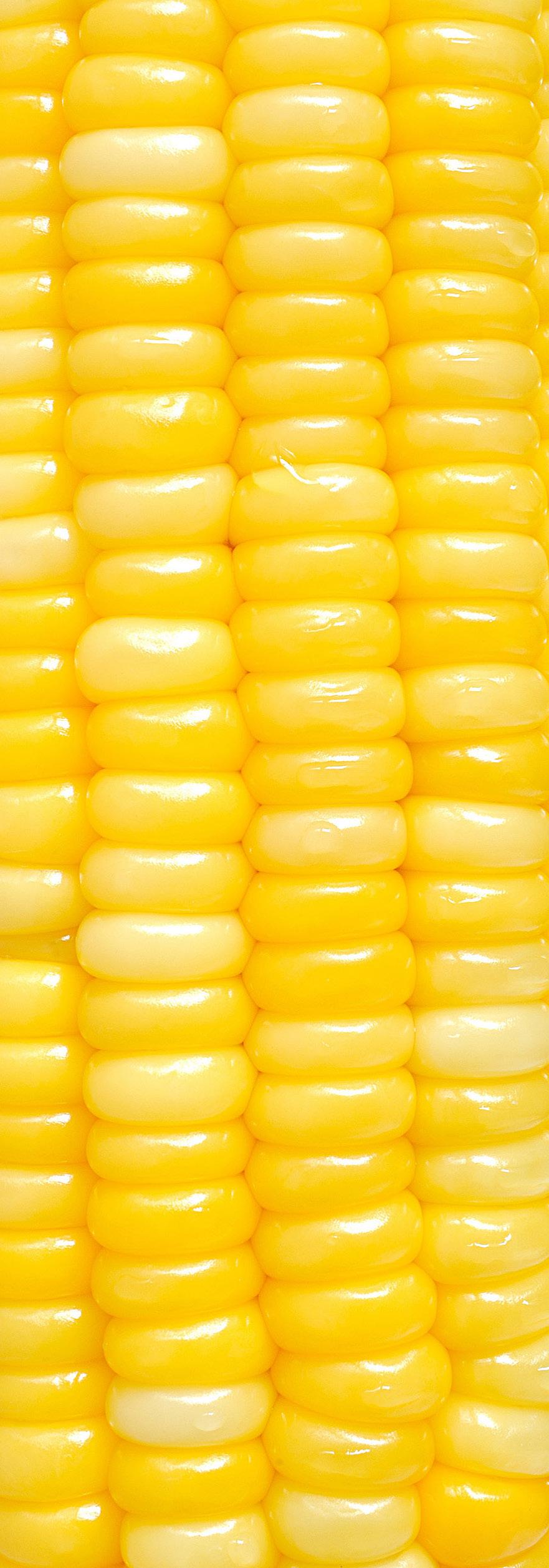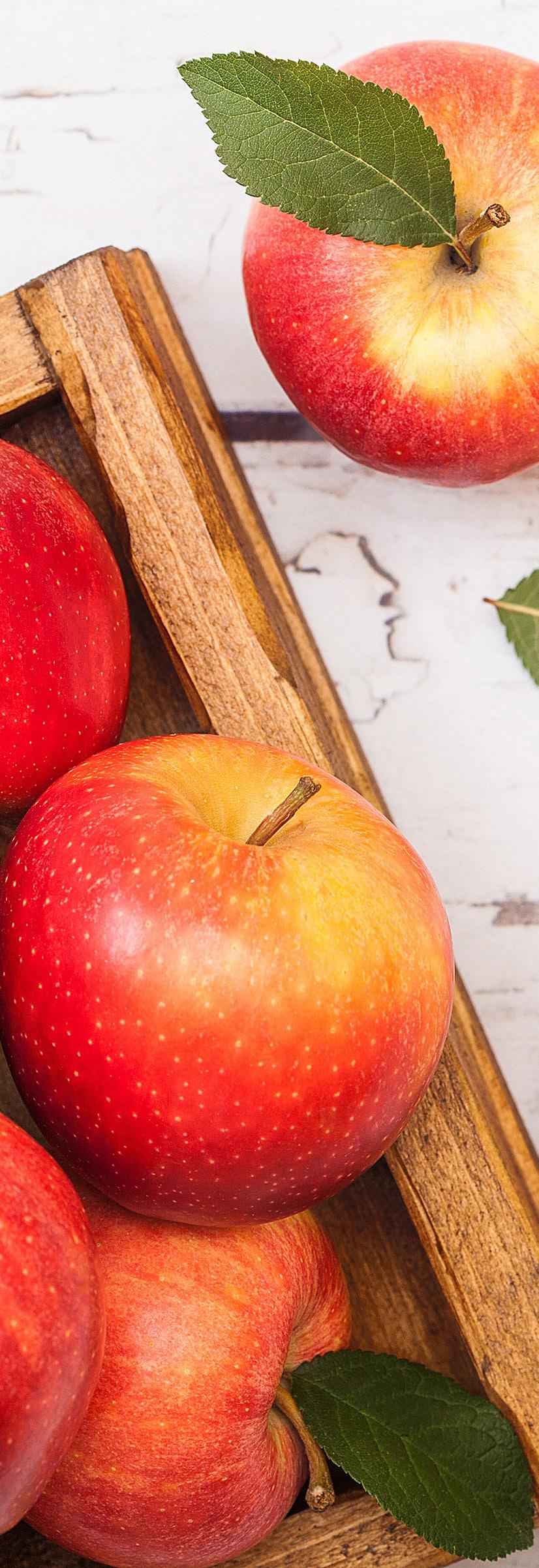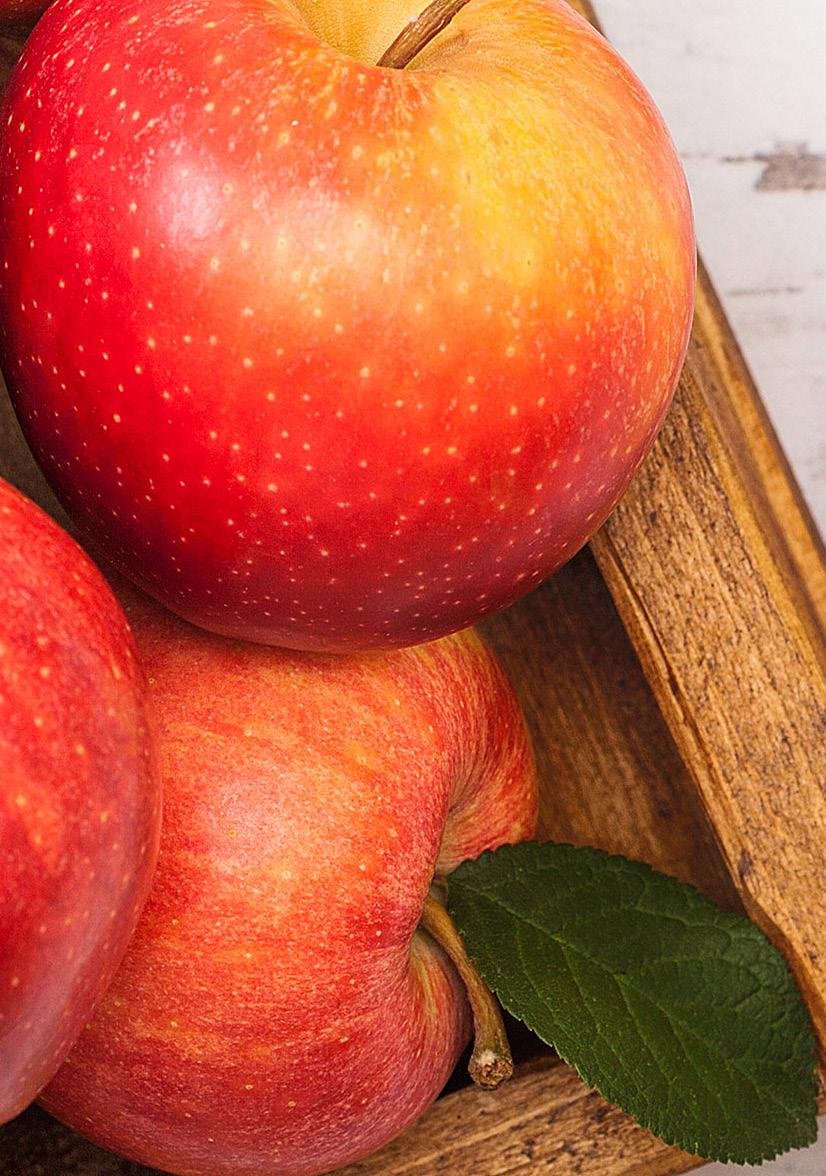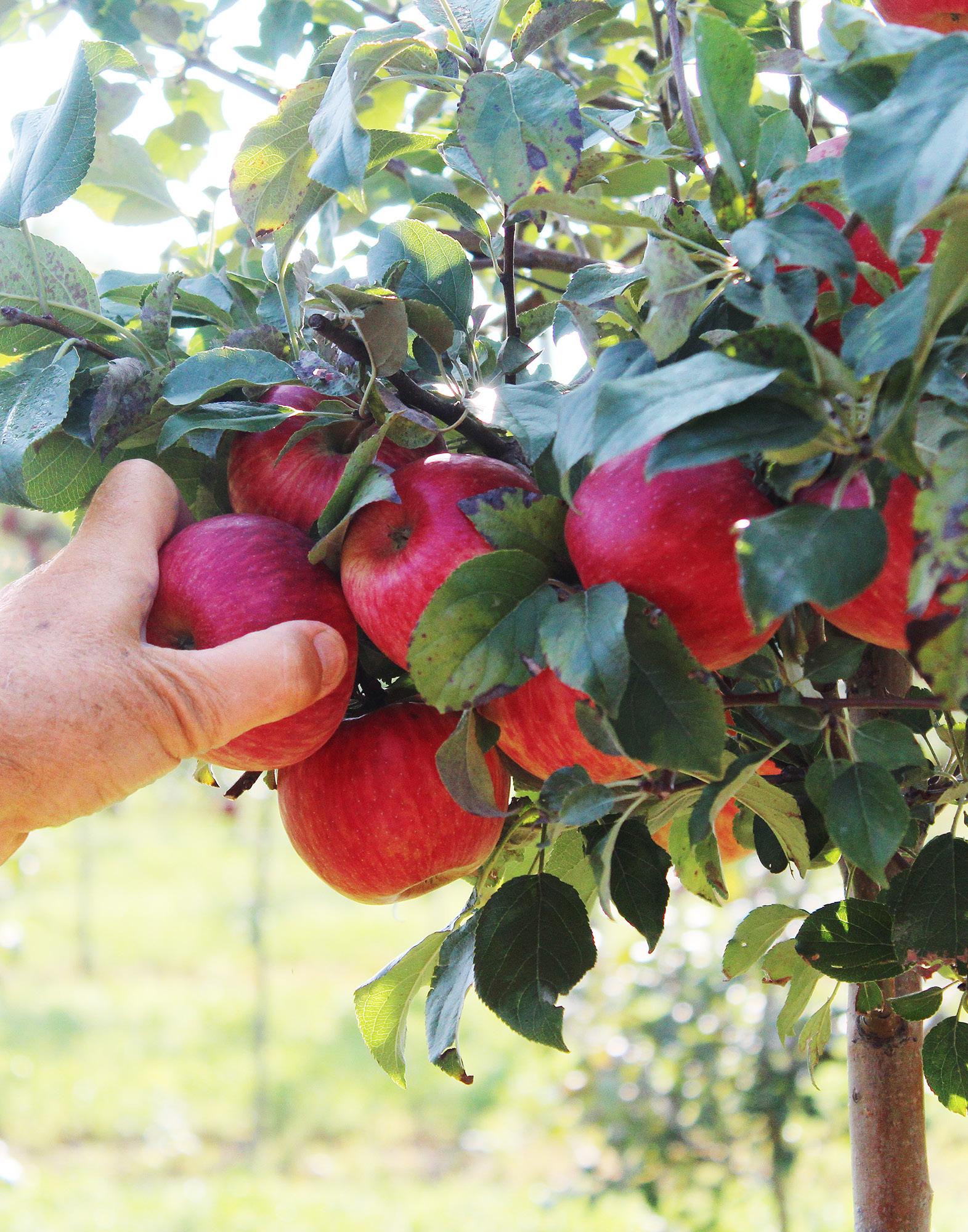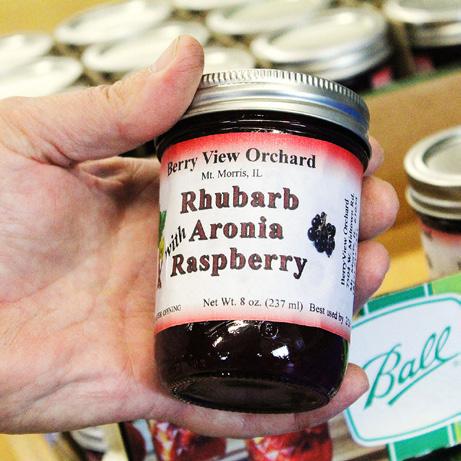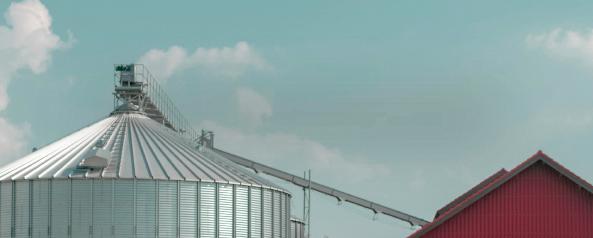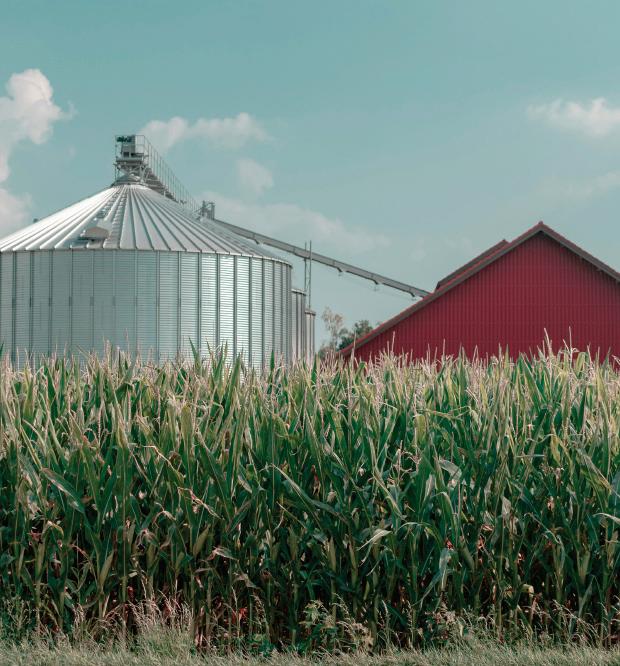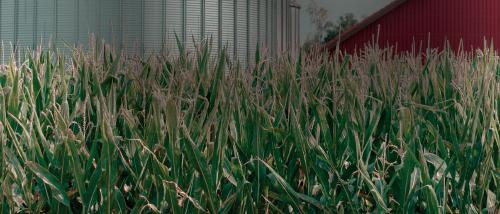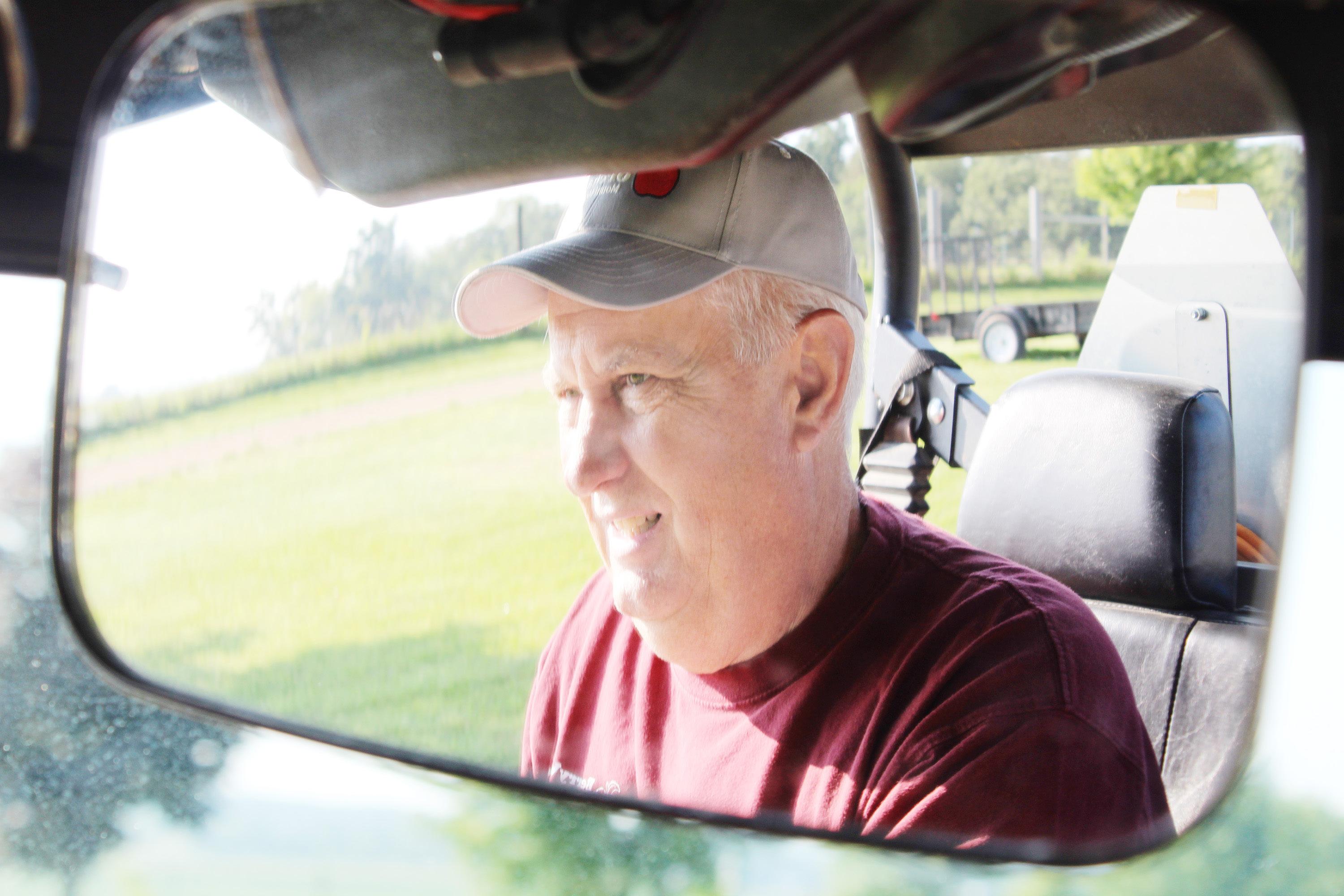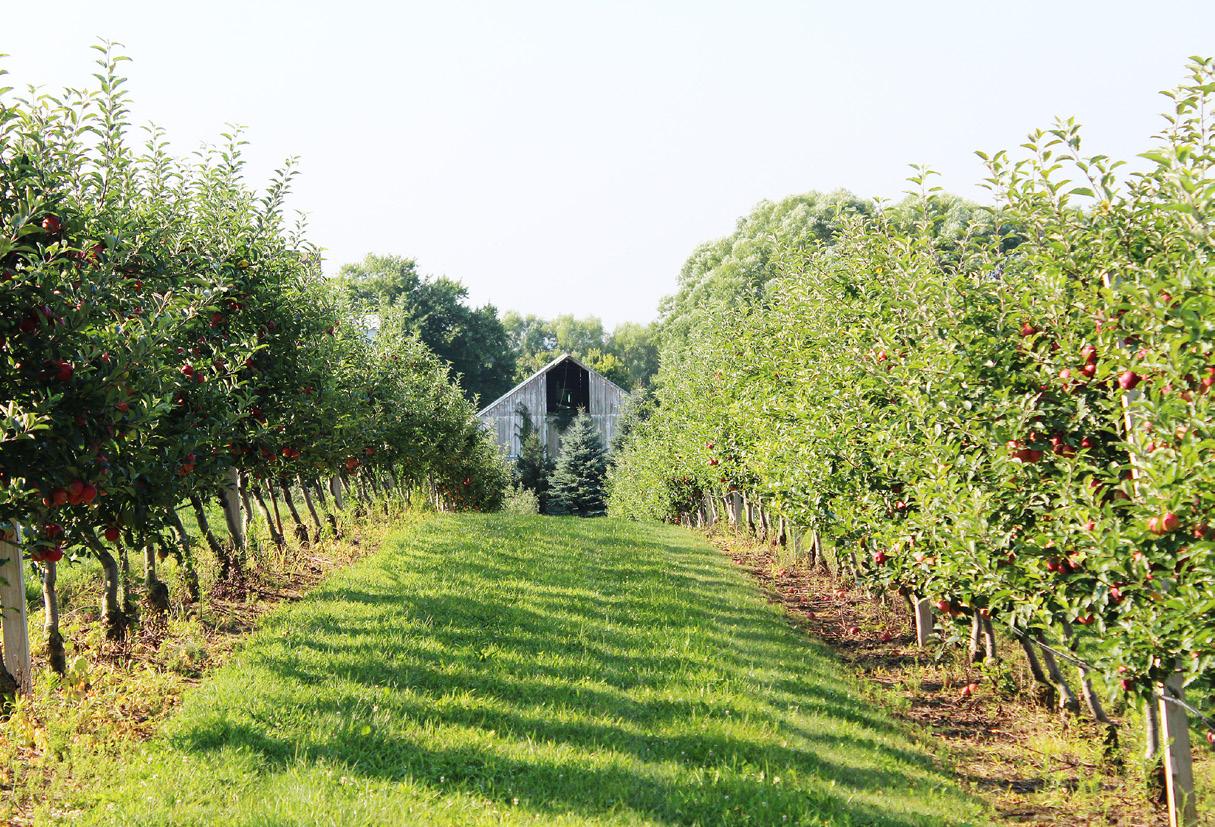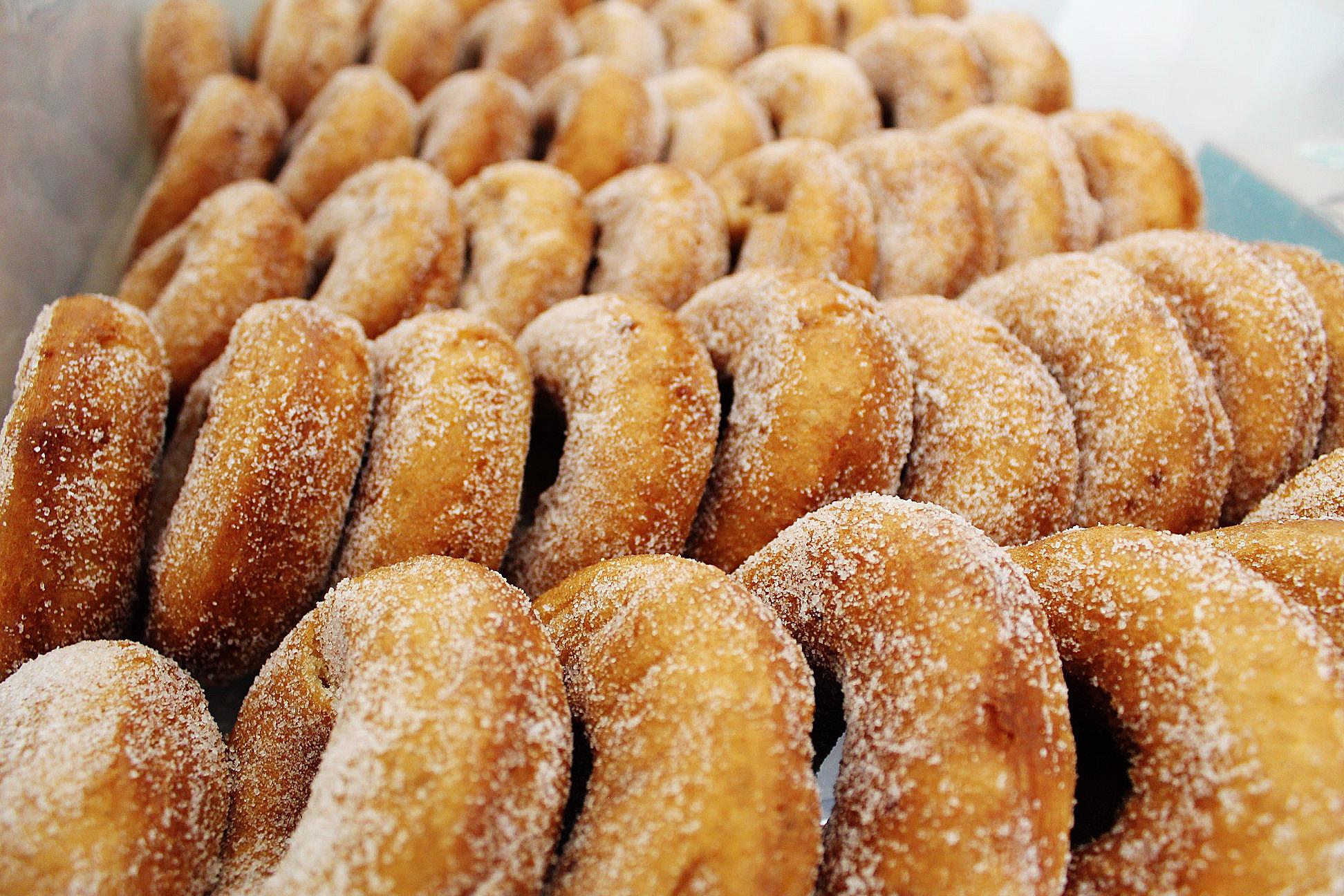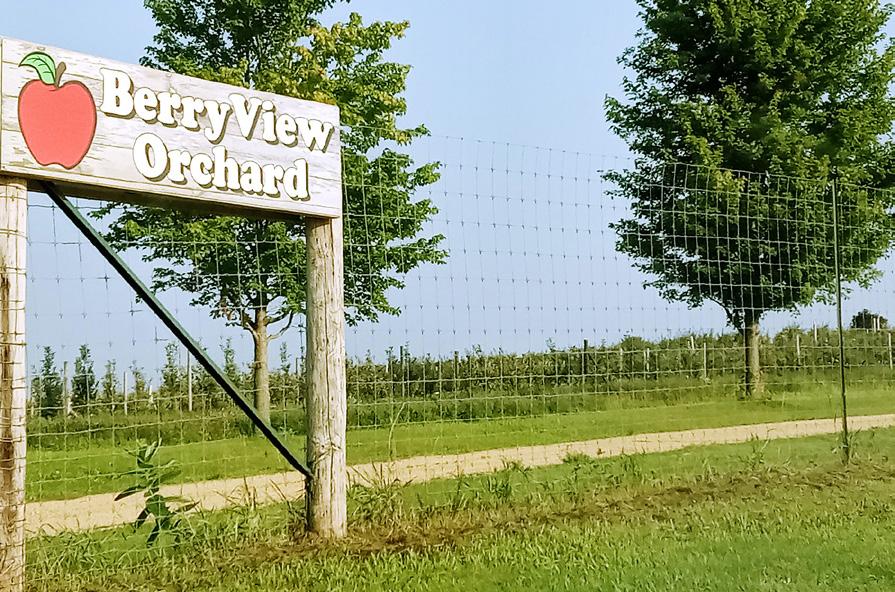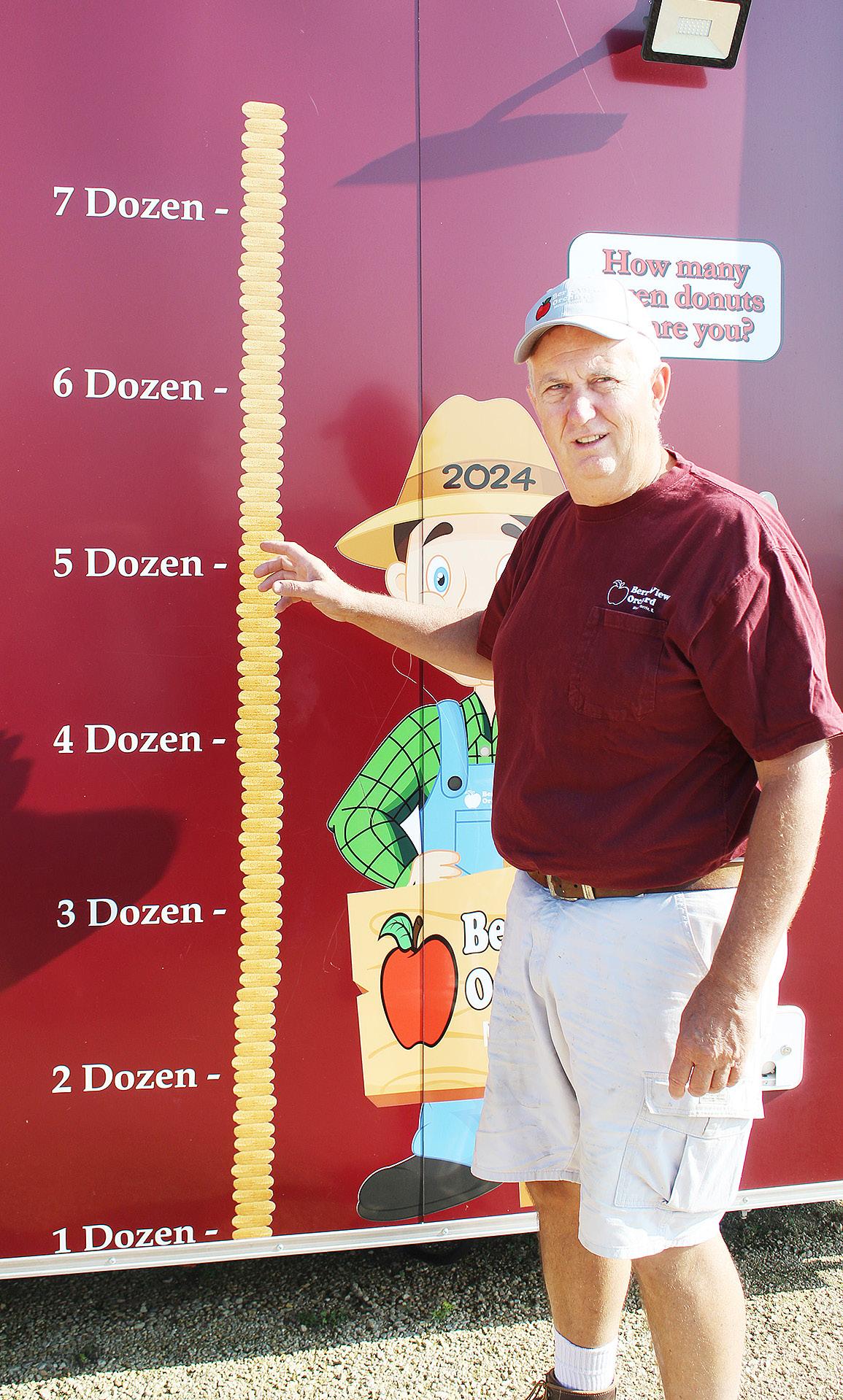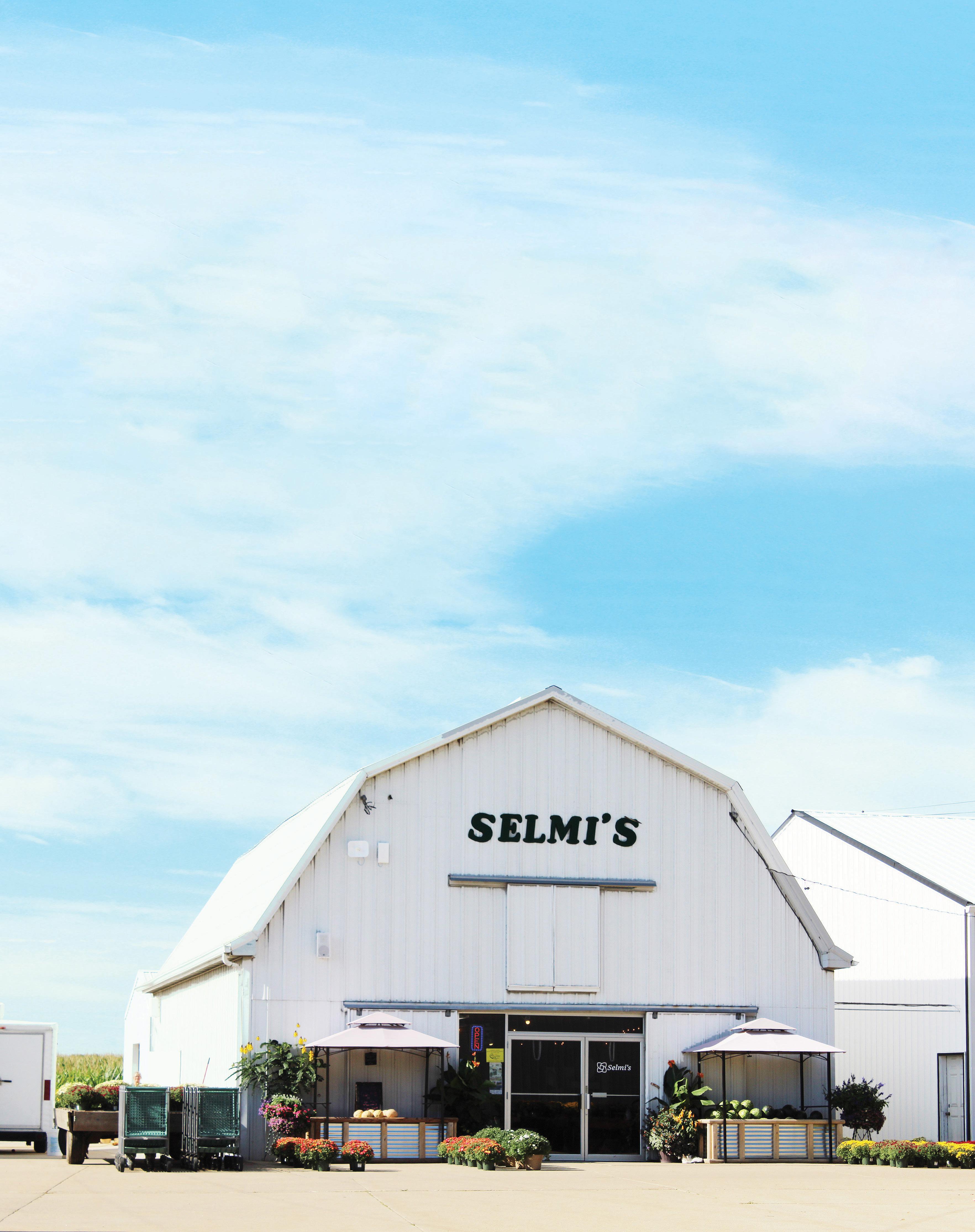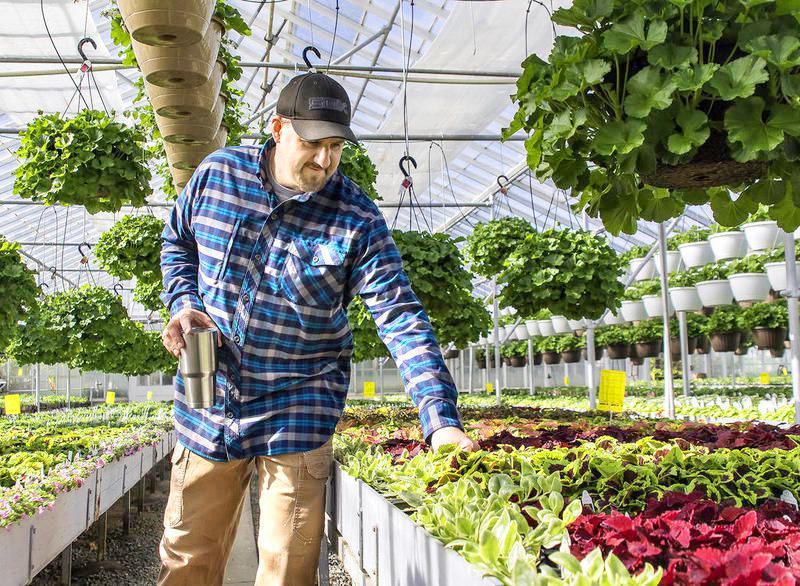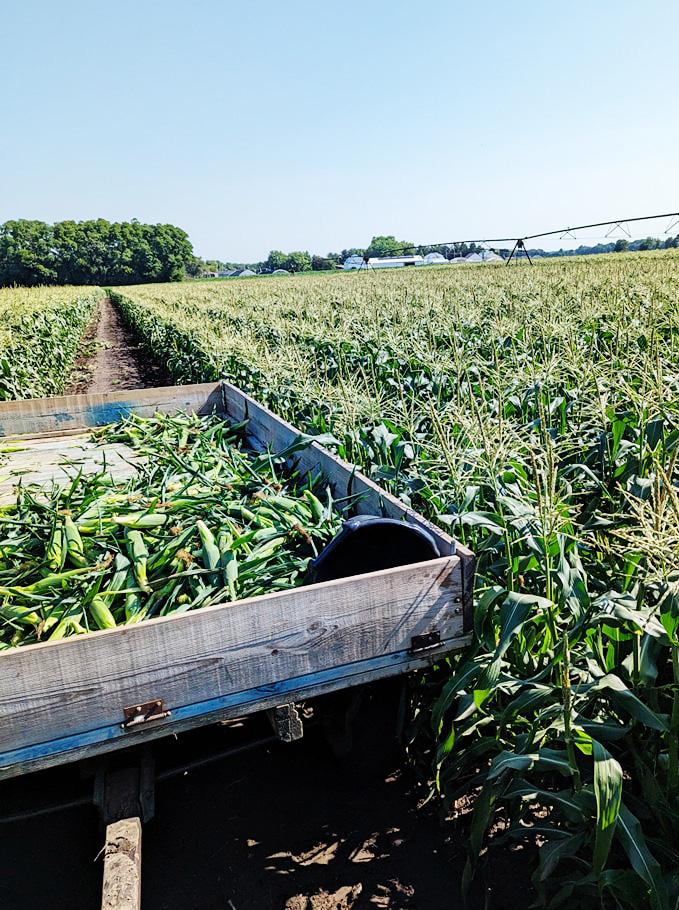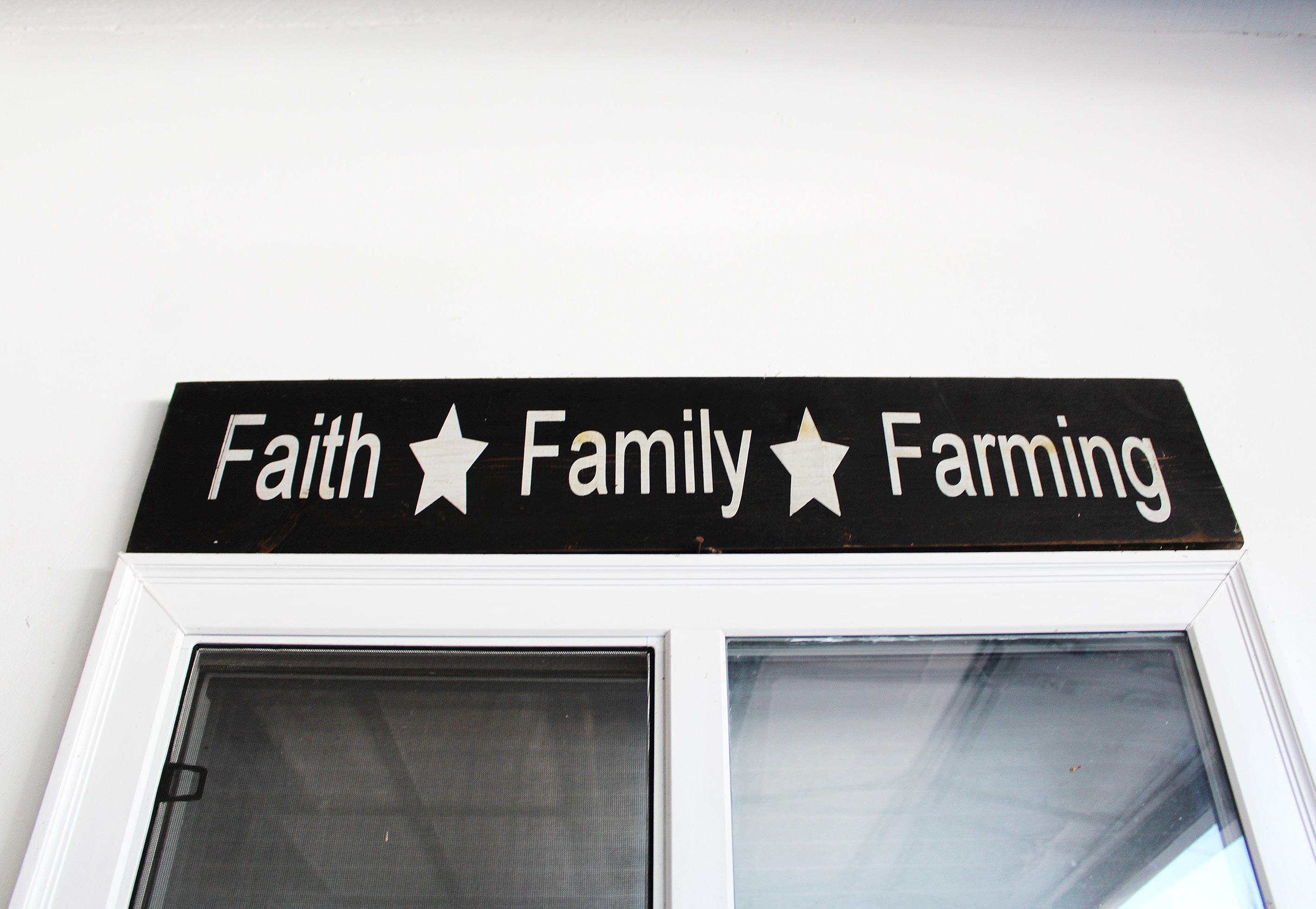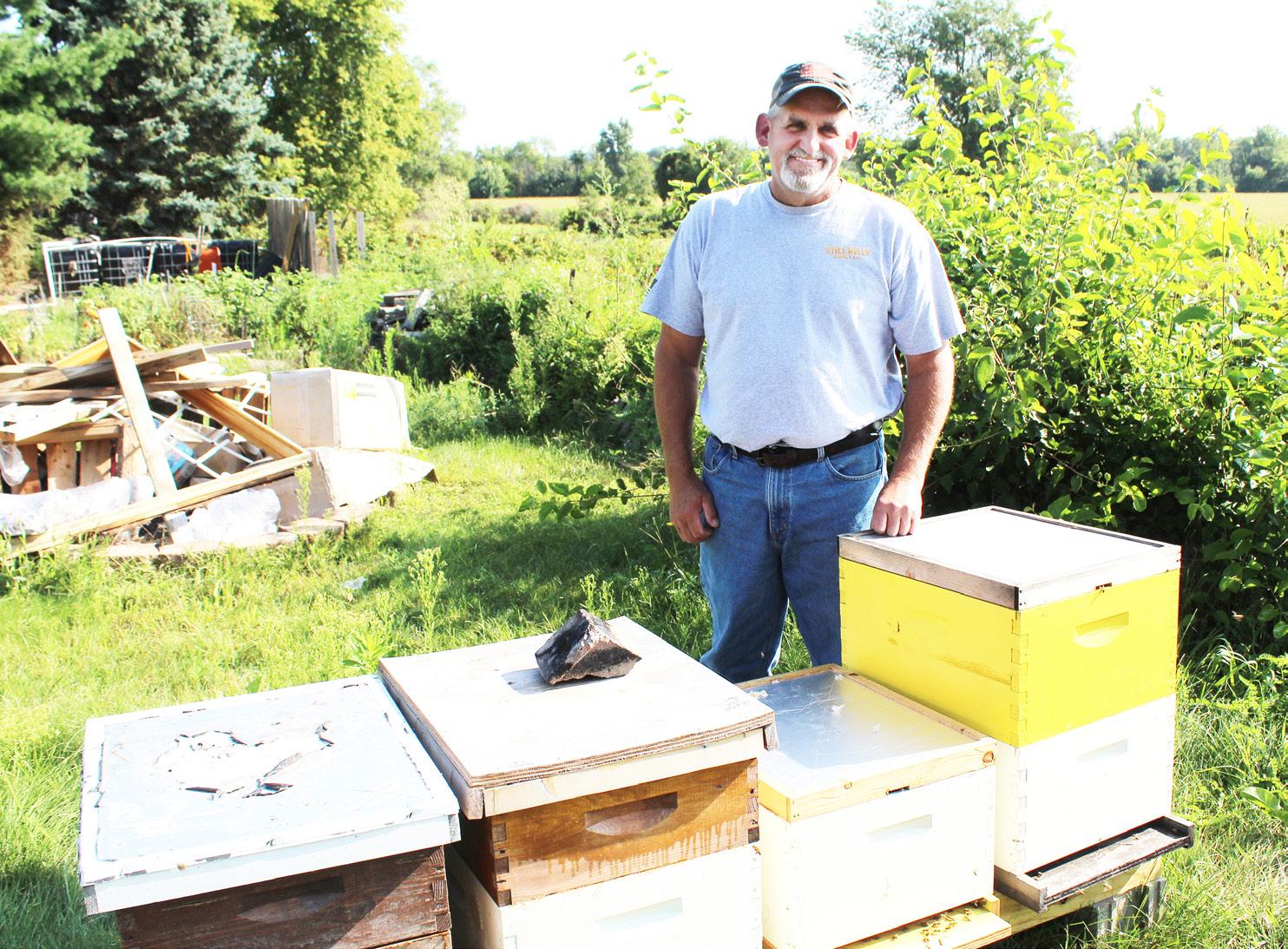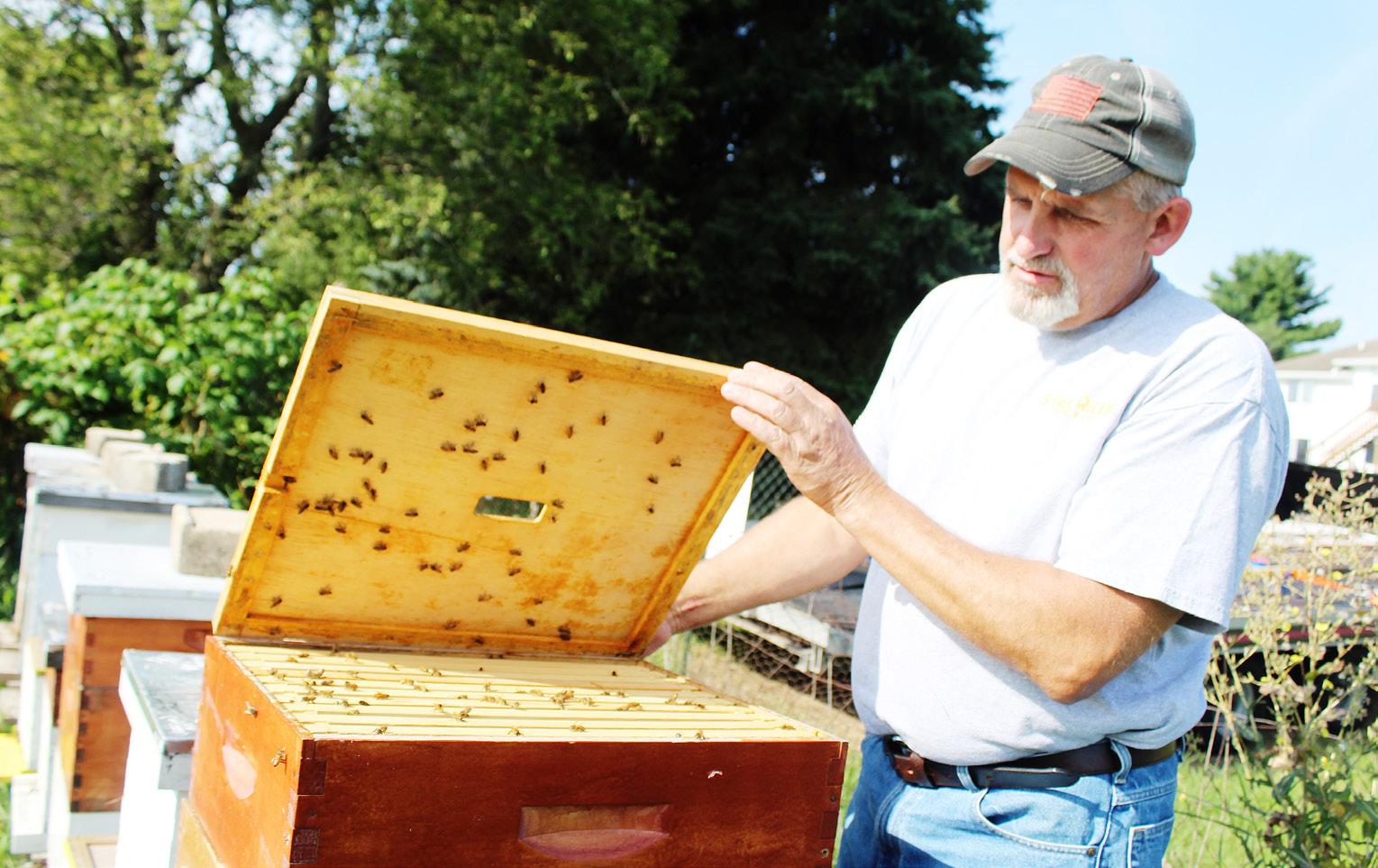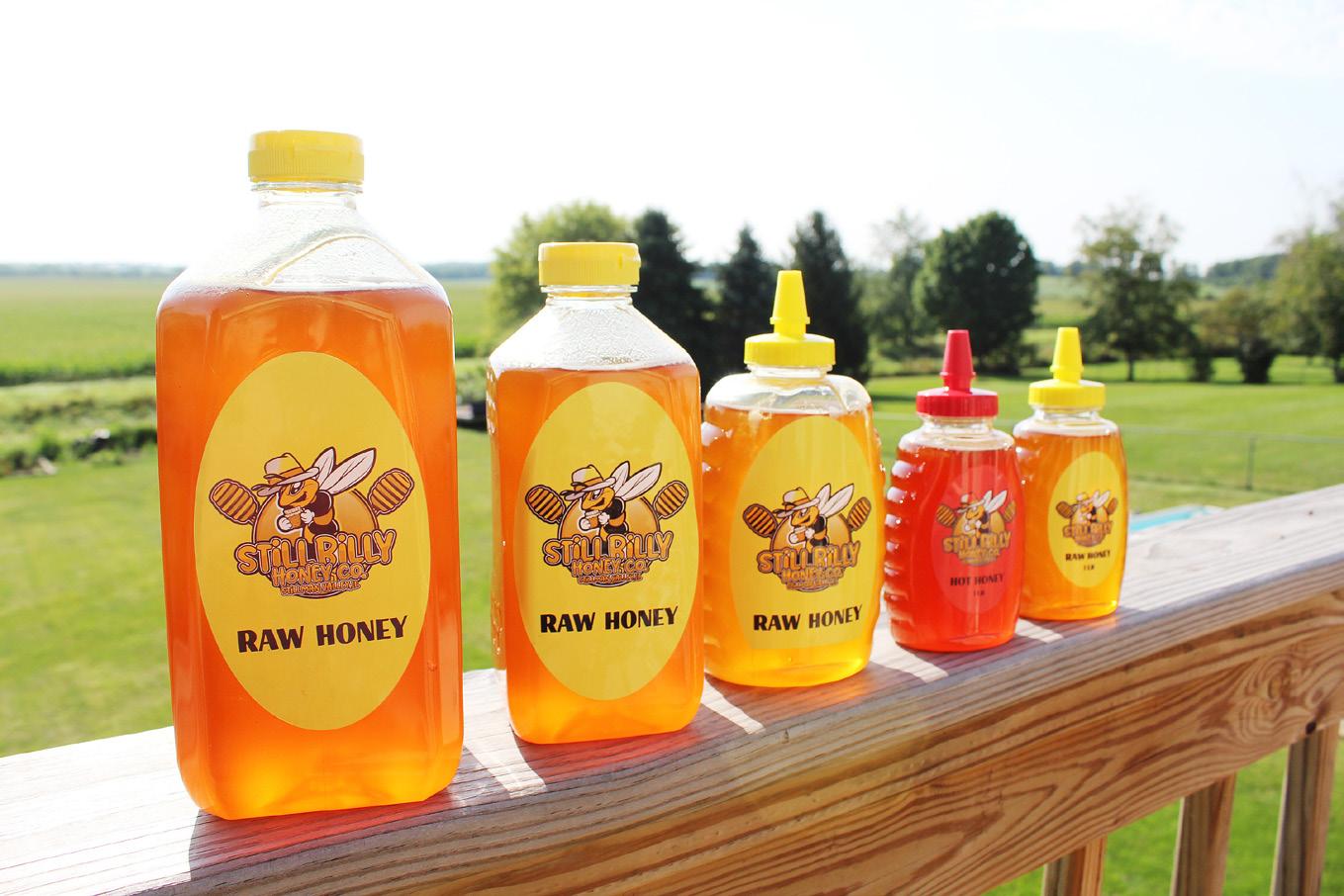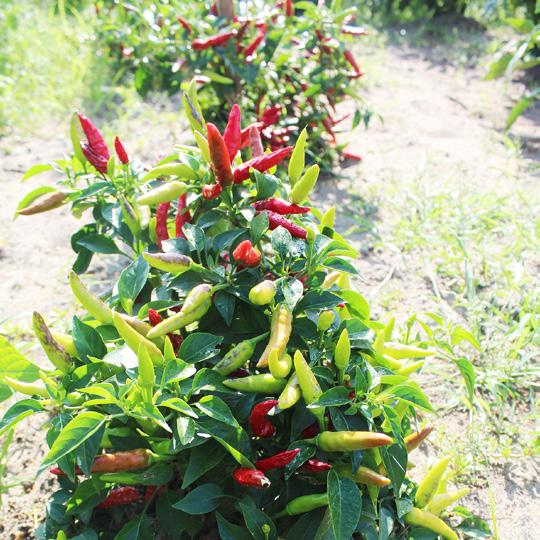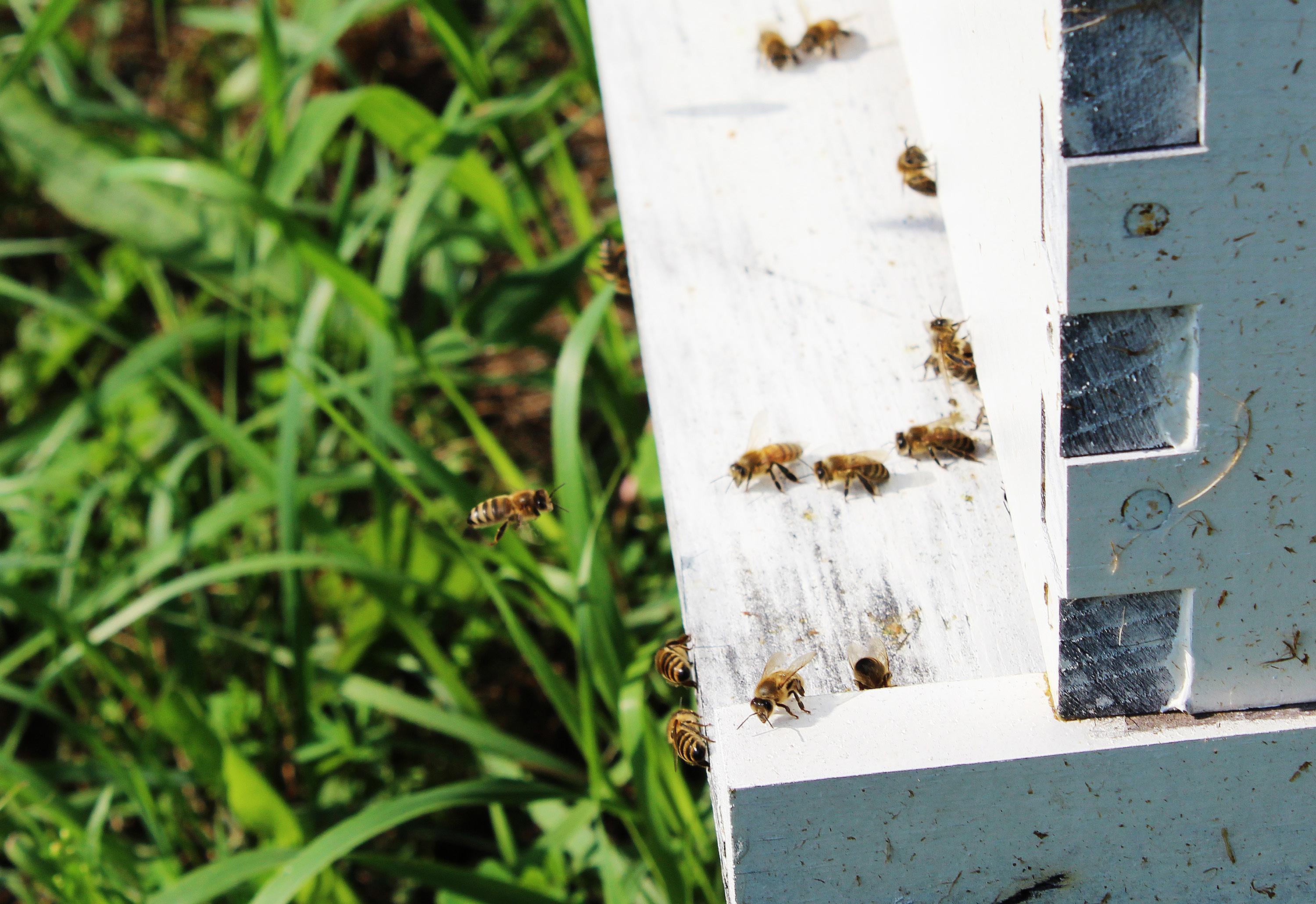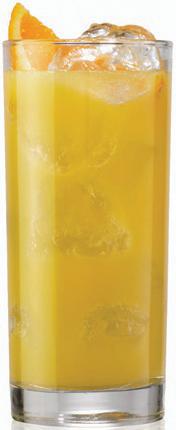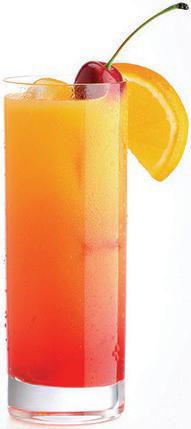ROOTS BRANCHES ROOTS BRANCHES
BERRYVIEW cont’d from page 3
Apples are available pre-picked or customers can buy a bag and fill it during a “you pick” experience, roaming the orchard and picking apples from trees marked with flags.
“When you go to an orchard, you know where they came from,” Warren said. “It’s a nice experience for people to come out as a family and spend a day.”
The Warrens began their produce-growing adventures in 2010 with a crop of aronia berries, which are also called chokeberries and look a lot like blueberries. Aronias are rich in sugar and antioxidants, and are a good source for those who need to increase their blood sugar.
“Everyone sees them and thinks it’s a blueberry, and they think it’s going to taste like a blueberry,” Warren said. “It’s a wild berry and has a very wild berry flavor. It has three to four times the antioxidants of blueberries, so it’s a very healthful berry. There’s a lot of medical benefits, it’s good for diabetes, good for controlling blood sugar.”
BERRYVIEW cont’d to page 5
As with any kind of produce, weather can make or break a crop. In 2021, hot weather and a lack of rain cut short the aronia season with a disappointing crop. This year’s crop is much different: More rain than usual during July has made most of the berries come out thicker and plumper, some even dropping to the ground before they’re picked.
Some of the aronias are made into jams sold at the orchard’s store, and can also be an ingredient for pies — just don’t go overboard.
“I tell people that if you’re going to make a pie, don’t make an aronia pie because it can be too much,” Warren said. “If you want to make an apple pie, take your normal apple pie recipe and make it, and then sprinkle maybe a cup of aronia berries over the top. The berry will burst as it bakes, like a cranberry, and then that juice will go through the apple. It makes for a wonderful apple pie with the combination of the two.”
BERRYVIEW cont’d from page 5
The orchard’s store offers pre-picked apples, berries and pears, along with homemade jams. Hot apple cider donuts are made daily, which Warren likens to cookies that come fresh from the oven: “It’s kind of like a warm cookie,” he said. “You can’t beat a warm donut.” Also sold are products from Mount Morris area artisans such as Jen’s Artisan Bread and meats from Nelson Farms.
While apples and aronias have been longtime staples at the orchard, the couple has also grown and sold pumpkins for the past three years, and new this year: sunflowers.
Warren has enjoyed evolving his business over the years, and finds every trip through the trees a new unique experience.
“You got to enjoy what you’re doing,” Warren said. “It’s a lot of work, but I enjoy being outside doing it.” n
Cody Cutter can be reached at 815-632-2532 or ccutter@shawmedia.com.
lot of people can say they have roots in Rock Falls, but not all of them can say that they’ve turned them into a thriving business that’s been part of the of the local landscape for generations.
Nearly 90 years after Francisco Selmi planted his first vegetables at his farm east of town, the same Selmi soil continues to help produce plump fruits and veggies that have made the family name one of the most recognizable in town, and have put their produce in countless plates and picnic tables throughout the Sauk Valley for more than 70 years.
Through four generators of Selmis, the family operation has just kept on growing, now, with Francisco’s great-grandson, Matt Selmi, carrying on the family tradition, continuing to offer fresh fruits and vegetables while finding new ways to keep the business fresh, too.
SELMI’S cont’d to page 9
cont’d from page 7
Like his parents, Frank and Connie, before him, Matt has helped the farm evolve from a market to an agri-tourism experience. Today, a visit to Selmi’s is more than just a shopping trip, it’s a family outing for all ages. Among the attractions are some “feets” of fun: a 60-foot Jumping Pillow where you can jump for joy, the 200-foot Mt. Selmi Slide, or a 40-foot track for Rat Rollers, and those are just a few of the fun things to do.
The past four years have been ones of change for the farm, Matt said, from going back to the drawing board during the coronavirus pandemic to the launch of U-pick experiences for apples and pumpkins starting this fall.
“What was important was coming out and walking out on the farm to see the different things you see on a farm,” Selmi said. “Right now I’m trying to spread this farm out to where they can be out in the back to see where the corn is, or out picking apples, just venturing out on the farm and giving them a glimpse of how it’s done. We’ll take them and show them around and answer questions and interact with them, and it’s a great way to get to know our customers.”
SELMI’S cont’d to page 10
SUBMITTED
SELMI’S
cont’d from page 9
Selmi’s seasons begin in April, with the spring season that gets a green thumbs up from customers shopping for plants: annuals, perennials, vegetables and tropical indoor and outdoor varieties, straight from Selmi’s greenhouse. The summer season brings fruits and produce to the market, with tomatoes, green beans, cucumbers, hot and sweet peppers, zucchini grown on the farm, as well as wholesale fruits and vegetables. Finally, the fall season (Sept. 13 through Halloween) wraps up the year before a winter break, and it’s a busy season. In addition to the farm’s other family activities, there’s a haunted house and haunted hay rides in time for Halloween, an amazing maize maze, Minion Cart tours of the pumpkin patch, a petting zoo, face painting and magic acts, and hot apple cider donuts and slushies.
Pumpkins and sweet corn have been among Selmi’s best-selling items for the past 30 years, but with Matt’s involvement in the business, he took on a task that his parents thought of but never got off — or in — the ground: apple orchards.
Matt began planting apple trees in 2018, starting with honeycrisps and today there are around 5,000 different trees that grow 15 dwarf varieties.
Apples had been part of Selmi’s market for years, but brought in from other growers, so Matt sought to grow them on his own in the same soil that’s been so good to his family for years.
“I was watching what customers were asking for,” Selmi said. “My parents carried honeycrisps from local farmers to sell and people loved them. When I tasted that honeycrisp, I was like, ‘Wow! That’s a different kind of apple.’ That’s kind of what got me going and deciding to grow some apples. It really fits into our whole farm with growing sweet corn and growing flowers.”
It took plenty of perseverance and trial and error, though, to make the orchards a success but Matt’s found plenty of support from his peers.
“The family orchards of Illinois are awesome,” Matt said. “They’ve been super helpful and are able to answer any questions you may have. It’s been a world of knowledge to take in, and we started growing totally different after we started going around and looking more.”
cont’d to page 11
SELMI’S
SELMI’S
The apples have been a big hit with customers, rivaling Selmi’s signature corn and pumpkins in popularity.
“I think every generation adds their little thing to it that they like and enjoy,” Matt said. “My dad was a sweet corn man and grew the varieties that everyone loves. Him and Mom devoted a lot of time to that, and then started the pumpkin patch. Having something to grow off of is nice.”
The Selmis were one of several families who came to Rock Falls from Italy during the early 1900s. Francisco and his wife Natalina emigrated to the United States in 1912 and settled on a farm north of East Coloma School; their son Agostino (“Art”) turned the family farm into a business, Shore Acres Greenhouse, in 1951 and moved it to a farm about one-quarter mile west, where the business is today.
at the University of Illinois. Along with running the family farm, he taught horticulture at Whiteside Area Vocational Center in Sterling during the 1970s and ’80s. Frank and Connie gradually sold their interests to Matt during the 2010s, but continue to work on the farm when they can.
Matt and his wife Melanie have two children, Anthony and Kellen, who enjoy working alongside their father and grandparents. Matt is hopeful they can carry on the family tradition to a fifth generation of ownership in the future.
Selmi’s, 1206 Dixon Ave. in Rock Falls, is open from 9 a.m. to 6 p.m. daily through October. Find “Selmi’s Greenhouse, Farm and Pumpkin Patch” on Facebook, Instagram (@selmifarm) and YouTube; go to selmi.com or call 815-626-3830 for more information.
Agostino’s son Frank was the first in his family to graduate from college, having studied agriculture
“We meet so many new people, and we’re getting people from further and further every year,” Selmi said.
“It’s neat to tell our story to people who don’t know it. Then our local customers tell other people when they travel. It’s a real cool feeling. We do work hard and definitely see that people appreciate what we’re doing.” n Cody Cutter can be reached at 815-632-2532 or ccutter@shawmedia.com.
Michael Meurer got hooked on hives a few years ago and turned them into a business, selling his StillBilly Honey at local stores and pop-up markets. He has 14 hives in his back yard and nine more elsewhere in Ogle County.
efore most people can turn a hobby into a way to earn money, they have to learn the ABC’s of their business.
For Michael Meurer, he had to learn the A, Bee, C’s.
When Meurer was looking for a new hobby a few years ago, he found it in the hives and honeycombs of one of nature’s most industrious and indispensable workers, the bee, and managed to parlay those pollinators’ hard work into a nice little business. Today, the Byron beekeeper-turned-businessman works with his busy little bees to make StillBilly Honey, which he sells at local pop-up markets and stores.
The business has not only helped boost his income, it’s helped him boost awareness of honey’s health benefits, as he shares what he’s learned about it with his customers.
Honey is more than just a sweet treat, there are health benefits in the ooey-gooey goodness too — among them: Honey straight from the hive is a healthier alternative to sugar, it’s rich in nutrients and antioxidants, and has antibacterial properties.
Michael Meurer checks on some of his bees.
STILLBILLY cont’d from page 12
“It’s natural sweetness,” Meurer said. “It doesn’t have all of the additives, and it’s better for you. If you have allergies, it will help you. They take the pollen and turn it into honey along with the nectar. You’re getting the pollen and the nectar, you’re getting all of that good stuff; so if you have allergies, it tones it down.”
Meurer has 14 hives in his back yard in Byron, attracting bees with both his garden and the fruit trees that grow around his neighborhood. He has six more hives in Leaf River and another three in Stillman Valley, where his adult daughters, Samantha and Lindsey, attended school — in fact, those school days helped inspire the name of the business.
STILLBILLY cont’d to page 14
regarding your specific situation.
STILLBILLY cont’d from page 13
StillBilly Honey is available in 1-, 2-, 3and 5-pound containers, including a hot variety, flavored with tobacco peppers that Meyers grows in his garden.
The idea for the StillBilly name came from Lindsey, who found it interesting that Byron kids were called “B-Boys” and those from Stillman Valley were referred to as “StillBillies” — and that’s just one aspect of the family involvement in the business; another is his wife Doris’ dedication to researching and learning more about about honey, information that Michael passes along to his customers through conversations and information cards at markets.
“If you’re diabetic, obviously sugar is your enemy, but honey is a natural substitute that you can put in your coffee or tea,” Meurer said. “It’s better than cane sugar, and there
are recipes out there where you can substitute cane sugar with honey. Instead of putting syrup on your pancakes, you can put it on your toast — all within reason.”
Meurer sells honey in jugs of one, two, three or five pounds; and there’s also a one-pound jug of hot honey, mixed with sauce from tabasco peppers he grows in his garden.
STILLBILLY cont’d to page 15
His success in the honey business was slow-flowing at first.
With his daughters in college and Meurer looking for something to get him off the couch and onto something new to do, he came across some YouTube videos of beekeeping and it got him thinking that maybe he could try it himself. He started with a pair of hives, but they didn’t last long, and his attempt the following year “wasn’t much better,” he said. During his third year, one hive lived and the other died. Determined to make it a success, Meurer sought help from other beekeepers
CODY CUTTER/CCUTTER@SHAWMEDIA.COM
What’s all the buzz in Michael Meurer’s backyard in Byron? It’s colonies of honey bees hard at work — just don’t disturb them; you could get a stinging rebuke.
in the area, who encouraged him to keep trying.
“I’m just gradually learning, and it’s just rolling into what it is now,” Meurer said. “You just can’t quit. Every beekeeper I’ve ever met has told me that you’re going to have failures and not succeed right off the bat. You always need to keep trying to learn.”
So, Meurer kept trying, and kept learning. Two hives turned into four, and then four turned into eight, and things just kept buzzing along, until those bees were producing so much honey that Meurer had to figure out what to do with it. That’s when he decided to turn honey into money — though that wasn’t the plan when he first got into beekeeping five years ago.
STILLBILLY cont’d from page 14
STILLBILLY cont’d to page 16
“That was the last thought in my mind,” he said. “I just wanted to have some bees. It’s kind of like, when you have one you want two, when you have two you want four.”
But when a golden opportunity knocked, he decided to answer the door.
These days, StillBilly Honey is sold year-round at Sweetbean Cafe and Bakery in Byron and the Royal Blue General Store in Stillman Valley. He’s also a regular vendor at farm ers markets in Lena, Oregon, Stillman Valley and Winnebago. In addition to having honey, he also rescues bees that are giving businesses and homeowners headaches. He recently rescued swarms that had been causing problems at Stillman Valley Cemetery.
Meurer has acquired a great appreciation of what bees can do to help both humans and animals alike, whether it’s helping calm a cough or nurturing nature as pollinators.
“It’s awesome knowing that you’re producing something and giving to your community,” Meurer said, “and you’re doing something for nature, giving back.” n
StillBilly Honey sells its honey at Sweetbean Cafe and Bakery, 114 S. Franklin St. in Byron; and Royal Blue General Store, 130 North Walnut St. in Stillman Valley. Find
Cody Cutter can be reached at 815-632-2532 or ccutter@shawmedia.com.
“Stillbilly Honeyco” on Facebook, email stillbillyhoneyco@gmail.com or call 815-378-4351 for more information.
